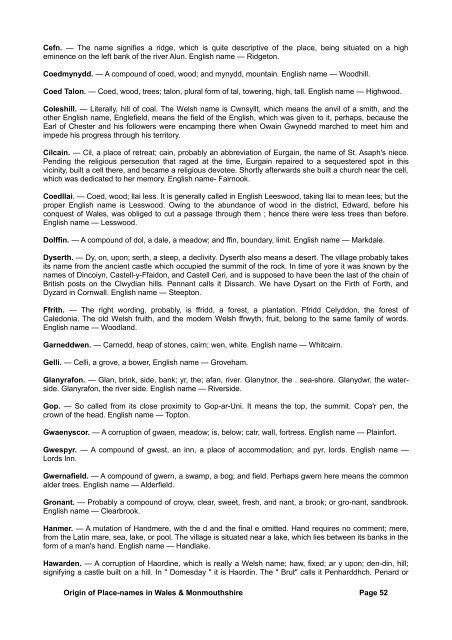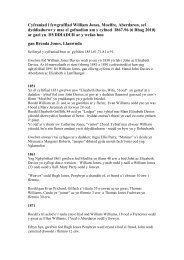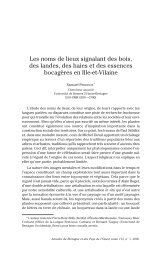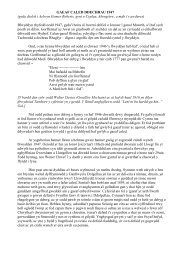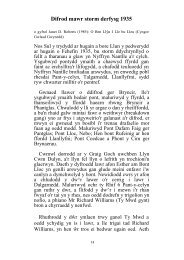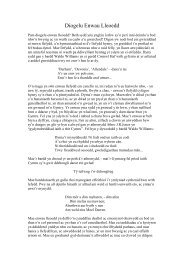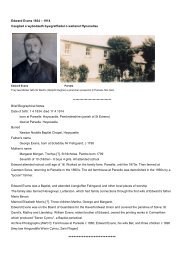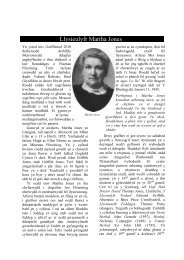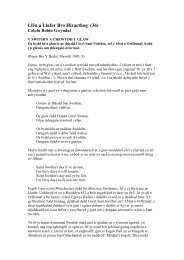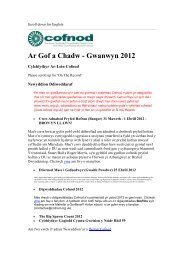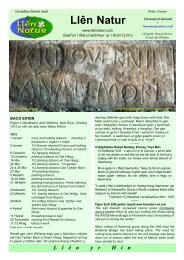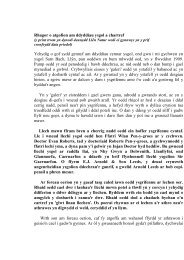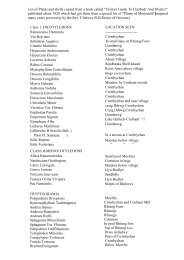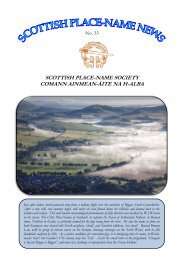Cymry <strong>in</strong> <strong>the</strong> middle ages. In <strong>the</strong> elegy <strong>of</strong> Meilyr on " Gruffydd ab Cynan " (twelfth century) we f<strong>in</strong>d <strong>the</strong>epi<strong>the</strong>t, " rex radau," k<strong>in</strong>g <strong>of</strong> gifts or graces. English name — K<strong>in</strong>gham.Ysbytty Ifan. — This village, situated on <strong>the</strong> banks <strong>of</strong> <strong>the</strong> Conwy, took its name from an ysbytty, hospital,that was founded here <strong>in</strong> 1189, by Ifan ab Rhys. Tir Ifan is ano<strong>the</strong>r <strong>place</strong> <strong>in</strong> <strong>the</strong> parish. English name —John's Hospital.FLINTSHIRE.The name <strong>of</strong> this county still rema<strong>in</strong>s an etymological puzzle. Mr. Jones, <strong>in</strong> his " History <strong>of</strong> Wales," says <strong>of</strong><strong>the</strong> Cambrians: — " It is probable that <strong>the</strong> national name <strong>of</strong> <strong>the</strong>se settlers was Flytwr-Flyndi* whence cameFl<strong>in</strong>tshire." O<strong>the</strong>rs th<strong>in</strong>k it was named after <strong>the</strong> castle, which was <strong>orig<strong>in</strong></strong>ally called Castellum- super-Fl<strong>in</strong>tum y- <strong>the</strong> castle near <strong>the</strong> sea. The county is exceed<strong>in</strong>gly rich <strong>in</strong> m<strong>in</strong>erals, especially lead <strong>and</strong> coal; but fl<strong>in</strong>tstoneshave not as yet been discovered <strong>the</strong>re; <strong>the</strong>refore, we must seek elsewhere for <strong>the</strong> <strong>orig<strong>in</strong></strong> <strong>of</strong> <strong>the</strong> name. Someth<strong>in</strong>k <strong>the</strong> name refers to <strong>the</strong> oblong form <strong>of</strong> <strong>the</strong> county, which, when look<strong>in</strong>g on <strong>the</strong> map, rem<strong>in</strong>ds one <strong>of</strong> <strong>the</strong>ancient Celtic knives which were made <strong>of</strong> fl<strong>in</strong>t.Adwy'r Clawdd. — Adwy, gap, breach; Clawdd 'r, a dyke. The <strong>place</strong> is <strong>in</strong> close proximity to Offa's Dyke;hence <strong>the</strong> name. English name — Dykeham.Argoed. — The name signifies a <strong>place</strong> on or above <strong>the</strong> wood, <strong>and</strong> is cognate with Arghait <strong>in</strong> Scotl<strong>and</strong>.English name — Woodham.Bodidris. — From Idris, <strong>the</strong> son <strong>of</strong> Llewelyn Aurdorchog (<strong>the</strong> golden-torqued), one <strong>of</strong> <strong>the</strong> lords <strong>of</strong> Idris.English name — Idriston.Bodfari. — The common op<strong>in</strong>ion is that <strong>the</strong> Roman station called Varis was here, <strong>and</strong> recent discoveries,corroborate <strong>the</strong> <strong>the</strong>ory; hence <strong>the</strong> name. English name — Variston.Bettesfield. — The general op<strong>in</strong>ion is that <strong>the</strong> field belonged to a woman called Betty. A field below <strong>the</strong> Bailyhill, called Cat Owaen, Owen's field, is supposed to be <strong>the</strong> <strong>place</strong> where Owen <strong>and</strong> his men encamped when<strong>the</strong>y stormed <strong>the</strong> Baily castle. There are several fields <strong>in</strong> this district ei<strong>the</strong>r affixed or prefixed by proper<strong>names</strong>. The right word<strong>in</strong>g would be Bettysfield.Baggilt. — This name is a perversion <strong>of</strong> Bugeillt r which is a compound <strong>of</strong> bu, a cow, an ox, <strong>and</strong> geillt, <strong>the</strong>plural form <strong>of</strong> gallt, a cliff, an ascent. English name — Oxcliff.Broughton. — Pennant says that ere <strong>the</strong> Norman Conquest this <strong>place</strong> was held by Lovelot, <strong>and</strong> afterwardsby Brochetune. The latter name was probably conferred upon <strong>the</strong> <strong>place</strong>.Cilowen. — Cil, a hidden <strong>place</strong>. This name was given <strong>in</strong> honour <strong>of</strong> Owen Gwynedd, who camped <strong>the</strong>re <strong>in</strong>order to avoid <strong>the</strong> <strong>in</strong>trigues <strong>of</strong> Henry II. English name — Owenton.Caerwys. — Caer, a fortress, a city; wys-gwys, summons. Some th<strong>in</strong>k that <strong>the</strong> Romans had a station here,where <strong>the</strong>y held <strong>the</strong>ir judicial courts. The bards, <strong>in</strong> time <strong>of</strong> yore, frequently held <strong>the</strong>ir sessions here. Aneisteddfod was held here by royal commission on <strong>the</strong> 2nd <strong>of</strong> July, <strong>in</strong> <strong>the</strong> 15th year <strong>of</strong> Henry VIII. The lastroyal summons for hold<strong>in</strong>g <strong>the</strong>se national festivals was issued <strong>in</strong> <strong>the</strong> n<strong>in</strong>th year <strong>of</strong> <strong>the</strong> reign <strong>of</strong> Elizabeth.English name — Courtton.Caerfallwch. — A corruption probably <strong>of</strong> Caer, stronghold; Afallech, proper name. In <strong>the</strong> pedigree <strong>of</strong> SirOwa<strong>in</strong> Tudor we f<strong>in</strong>d <strong>the</strong> name <strong>of</strong> " Afallech ap Afflech, ap Beli Mawr." This Afallech is supposed to be anephew <strong>of</strong> <strong>the</strong> renowned Caswallawn. On an adjacent hill called " Moel-y-gaer " <strong>the</strong>re are some rema<strong>in</strong>s <strong>of</strong> aBritish stronghold, which is supposed to have been under <strong>the</strong> comm<strong>and</strong> <strong>of</strong> Afallech dur<strong>in</strong>g <strong>the</strong> Roman<strong>in</strong>cursions. Afallech, or Afallach, means an orchard. English name — Orchardton.Caergwrle. — Caer is pla<strong>in</strong>; gwr, from cwr, a boundary; le-lle, a <strong>place</strong>, signify<strong>in</strong>g <strong>the</strong> border fortress. An oldcastle bear<strong>in</strong>g <strong>the</strong> name is situated about a mile from <strong>the</strong> village called Mope. It is supposed to have been aRoman outpost to Deva. English name — Borderfort.Orig<strong>in</strong> <strong>of</strong> Place-<strong>names</strong> <strong>in</strong> Wales & Monmouthshire Page 51
Cefn. — The name signifies a ridge, which is quite descriptive <strong>of</strong> <strong>the</strong> <strong>place</strong>, be<strong>in</strong>g situated on a highem<strong>in</strong>ence on <strong>the</strong> left bank <strong>of</strong> <strong>the</strong> river Alun. English name — Ridgeton.Coedmynydd. — A compound <strong>of</strong> coed, wood; <strong>and</strong> mynydd, mounta<strong>in</strong>. English name — Woodhill.Coed Talon. — Coed, wood, trees; talon, plural form <strong>of</strong> tal, tower<strong>in</strong>g, high, tall. English name — Highwood.Coleshill. — Literally, hill <strong>of</strong> coal. The Welsh name is Cwnsyllt, which means <strong>the</strong> anvil <strong>of</strong> a smith, <strong>and</strong> <strong>the</strong>o<strong>the</strong>r English name, Englefield, means <strong>the</strong> field <strong>of</strong> <strong>the</strong> English, which was given to it, perhaps, because <strong>the</strong>Earl <strong>of</strong> Chester <strong>and</strong> his followers were encamp<strong>in</strong>g <strong>the</strong>re when Owa<strong>in</strong> Gwynedd marched to meet him <strong>and</strong>impede his progress through his territory.Cilca<strong>in</strong>. — Cil, a <strong>place</strong> <strong>of</strong> retreat; ca<strong>in</strong>, probably an abbreviation <strong>of</strong> Eurga<strong>in</strong>, <strong>the</strong> name <strong>of</strong> St. Asaph's niece.Pend<strong>in</strong>g <strong>the</strong> religious persecution that raged at <strong>the</strong> time, Eurga<strong>in</strong> repaired to a sequestered spot <strong>in</strong> thisvic<strong>in</strong>ity, built a cell <strong>the</strong>re, <strong>and</strong> became a religious devotee. Shortly afterwards she built a church near <strong>the</strong> cell,which was dedicated to her memory. English name- Fairnook.Coedllai. — Coed, wood; llai less. It is generally called <strong>in</strong> English Leeswood, tak<strong>in</strong>g llai to mean lees; but <strong>the</strong>proper English name is Lesswood. Ow<strong>in</strong>g to <strong>the</strong> abundance <strong>of</strong> wood <strong>in</strong> <strong>the</strong> district, Edward, before hisconquest <strong>of</strong> Wales, was obliged to cut a passage through <strong>the</strong>m ; hence <strong>the</strong>re were less trees than before.English name — Lesswood.Dolff<strong>in</strong>. — A compound <strong>of</strong> dol, a dale, a meadow; <strong>and</strong> ff<strong>in</strong>, boundary, limit. English name — Markdale.Dyserth. — Dy, on, upon; serth, a steep, a declivity. Dyserth also means a desert. The village probably takesits name from <strong>the</strong> ancient castle which occupied <strong>the</strong> summit <strong>of</strong> <strong>the</strong> rock. In time <strong>of</strong> yore it was known by <strong>the</strong><strong>names</strong> <strong>of</strong> D<strong>in</strong>coiyn, Castell-y-Ffaidon, <strong>and</strong> Castell Ceri, <strong>and</strong> is supposed to have been <strong>the</strong> last <strong>of</strong> <strong>the</strong> cha<strong>in</strong> <strong>of</strong>British posts on <strong>the</strong> Clwydian hills. Pennant calls it Dissarch. We have Dysart on <strong>the</strong> Firth <strong>of</strong> Forth, <strong>and</strong>Dyzard <strong>in</strong> Cornwall. English name — Steepton.Ffrith. — The right word<strong>in</strong>g, probably, is ffridd, a forest, a plantation. Ffridd Celyddon, <strong>the</strong> forest <strong>of</strong>Caledonia. The old Welsh fruith, <strong>and</strong> <strong>the</strong> modern Welsh ffrwyth, fruit, belong to <strong>the</strong> same family <strong>of</strong> words.English name — Woodl<strong>and</strong>.Garneddwen. — Carnedd, heap <strong>of</strong> stones, cairn; wen, white. English name — Whitcairn.Gelli. — Celli, a grove, a bower, English name — Groveham.Glanyrafon. — Glan, br<strong>in</strong>k, side, bank; yr, <strong>the</strong>; afan, river. Glanytnor, <strong>the</strong> . sea-shore. Glanydwr, <strong>the</strong> waterside.Glanyrafon, <strong>the</strong> river side. English name — Riverside.Gop. — So called from its close proximity to Gop-ar-Uni. It means <strong>the</strong> top, <strong>the</strong> summit. Copa'r pen, <strong>the</strong>crown <strong>of</strong> <strong>the</strong> head. English name — Topton.Gwaenyscor. — A corruption <strong>of</strong> gwaen, meadow; is, below; catr, wall, fortress. English name — Pla<strong>in</strong>fort.Gwespyr. — A compound <strong>of</strong> gwest, an <strong>in</strong>n, a <strong>place</strong> <strong>of</strong> accommodation; <strong>and</strong> pyr, lords. English name —Lords Inn.Gwernafield. — A compound <strong>of</strong> gwern, a swamp, a bog; <strong>and</strong> field. Perhaps gwern here means <strong>the</strong> commonalder trees. English name — Alderfield.Gronant. — Probably a compound <strong>of</strong> croyw, clear, sweet, fresh, <strong>and</strong> nant, a brook; or gro-nant, s<strong>and</strong>brook.English name — Clearbrook.Hanmer. — A mutation <strong>of</strong> H<strong>and</strong>mere, with <strong>the</strong> d <strong>and</strong> <strong>the</strong> f<strong>in</strong>al e omitted. H<strong>and</strong> requires no comment; mere,from <strong>the</strong> Lat<strong>in</strong> mare, sea, lake, or pool. The village is situated near a lake, which lies between its banks <strong>in</strong> <strong>the</strong>form <strong>of</strong> a man's h<strong>and</strong>. English name — H<strong>and</strong>lake.Hawarden. — A corruption <strong>of</strong> Haord<strong>in</strong>e, which is really a Welsh name; haw, fixed; ar y upon; den-d<strong>in</strong>, hill;signify<strong>in</strong>g a castle built on a hill. In " Domesday " it is Haord<strong>in</strong>. The " Brut" calls it Penharddhch. Penard orOrig<strong>in</strong> <strong>of</strong> Place-<strong>names</strong> <strong>in</strong> Wales & Monmouthshire Page 52
- Page 1 and 2:
HANDBOOK OF THE ORIGIN OF PLACE-NAM
- Page 3 and 4: § § § § §The Author begs to st
- Page 5 and 6: pitiful cries of the railway offici
- Page 7 and 8: Bishop Percy says that "in England,
- Page 9 and 10: The city of Chester is still popula
- Page 11 and 12: There's Cumwhitton, Cumwhinton, Cum
- Page 13 and 14: Llwyn in its primary' sense means a
- Page 15 and 16: PLACE-NAMES IN WALES.Wales. — The
- Page 17 and 18: Church are generally dedicated to e
- Page 19 and 20: think he was a contemporary of St.
- Page 21 and 22: Rhosbeirio. — Rhos, a moor, a dry
- Page 23 and 24: of Brecknock," states that this vic
- Page 25 and 26: Cam cnwir ef Cwmdu,Cwm gwyn yw & n
- Page 27 and 28: Penderyn. — A corruption probably
- Page 29 and 30: Ardudwy. — Ar, upon or above; tud
- Page 31 and 32: to mark its pre-eminence over the o
- Page 33 and 34: Some think that eirw is a corruptio
- Page 35 and 36: present form — Caerfyrddin.Abergw
- Page 37 and 38: place of refuge; hence the name. En
- Page 39 and 40: Llansawyl. — The church was dedic
- Page 41 and 42: eject. The village took its name fr
- Page 43 and 44: house, and attempted to kill an inf
- Page 45 and 46: Gwydir. — Prima facie one may tak
- Page 47 and 48: Nefyn. — The church was probably
- Page 49 and 50: DENBIGHSHIRE.Anglicized form of Din
- Page 51 and 52: Llangollen. — From Collen, a sain
- Page 53: hands into their pockets to pay a c
- Page 57 and 58: Maesgarmon. — Named in honour of
- Page 59 and 60: Abertridwr. — Tridwr, three water
- Page 61 and 62: it is said, was originally built by
- Page 63 and 64: Cwmllynfell. — Cwm, a narrow vale
- Page 65 and 66: Gwarycaeau. — Gwdr, the nape of t
- Page 67 and 68: means a cultivated region, a vale,
- Page 69 and 70: Penrhiwfer.- Pen, head, top; rhiw,
- Page 71 and 72: Port Talbot. — So called in 1835
- Page 73 and 74: Trealaw. — This appellation was g
- Page 75 and 76: Aberdyfi. — So called from its si
- Page 77 and 78: Llanddwywe. — From Dwywau, a desc
- Page 79 and 80: Crickhowell and some in the directi
- Page 81 and 82: Griffithstown. — This village was
- Page 83 and 84: and gwy, water. Treiddiod troth tna
- Page 85 and 86: derive Tintern from din, fortified
- Page 87 and 88: Caersws. — It appears that the Ro
- Page 89 and 90: English name — Ervylton.Llanymech
- Page 91 and 92: Angle. — Probably from the angle-
- Page 93 and 94: Gellyswick. — Another hybrid. Gel
- Page 95 and 96: that the two rivers in their flowin
- Page 97 and 98: ecame the bishop of the see, and wa
- Page 99 and 100: earth formerly stood on a summit on
- Page 101 and 102: Pilleth. — A corruption of pwll,
- Page 103 and 104: Howells, Rev. J., Mountain AshHowel
- Page 105 and 106:
Williams, D., PenywernWilliams, Rev


